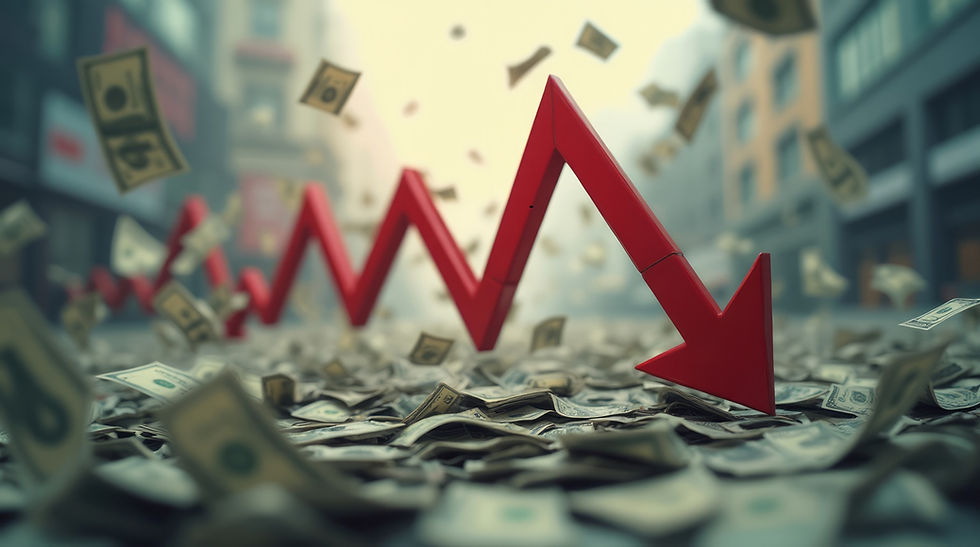Investing During Turbulent Times: How to Navigate Market Noise
- Ryan M. Vogel, CFP®

- Sep 18, 2025
- 5 min read
Updated: Oct 29, 2025

Key Takeaways
News informs us about what just happened, but markets are pricing in what investors believe will happen next.
Emotional reactions to headlines destroy returns; disciplined investing builds long-term wealth. A skilled advisor can keep you grounded and on track.
Diversified portfolios reduce volatility and help investors stay invested through market turbulence.
Some of the best times to invest are when things look and sound terrible.
Over the past few months, many clients have expressed a similar perspective during our review meetings: “I can’t believe how well our investments are performing despite all the bad news.” I’ve heard this comment many times throughout my years as an advisor. While it seems counterintuitive that stocks would perform well when we’re faced with war and political strife worldwide, stock markets have historically risen when the news is at its worst. Let’s revisit why this occurs and focus on how we should invest during tumultuous times.
Markets Are Forward-Looking, News Is Backward-Looking
The headlines from various news outlets consistently focus on the crisis of the day. It is easy to get caught up in the daily “noise.” However, if you broaden your focus and look at current economic data, you may be surprised to see low unemployment, low inflation, and strong earnings growth from U.S. companies.
The Federal Reserve has also been in the headlines recently as it has been setting expectations about reducing short-term interest rates over the next few months. Low interest rates make it easier for businesses and individuals to obtain and pay back loans, which is positive for future growth. Meanwhile, the U.S. dollar is falling relative to many other currencies, so non-U.S. investments are also doing well. Bonds are paying higher income thanks to higher interest rates. All those factors taken together lead to good investment returns for our clients because their investments are properly diversified.
We consistently remind our clients: News informs us about what just happened, but markets are pricing in what investors believe will happen next.

“Bad News” Can Be “Good News” for Markets
Weak economic data or gloomy headlines can be “good news” because they hint at lower interest rates or other forms of stimulus. For instance, recession fears in early 2023 spurred markets upward once investors believed the Fed would pause its interest rate hikes. As mentioned earlier, the Fed has recently hinted at lowering rates over the next few months. On the surface, you could say the Fed is lowering interest rates because it foresees a weaker economy, but there are other points of view that should be considered by investors. Some investors might argue that interest rates have been too high for too long and that lowering them will allow economic growth to continue. No one can reliably predict the future, but that is the point. Just because the news seems bad doesn’t automatically mean that all investors will interpret it that way.
The Fed is often slow to make changes to interest rates because it bases its decisions on data. Data takes time to collect and review. And the size of the data it’s working with is too large to do so in “real time.” I also think the Fed’s slow pace is intentional because it still has concerns about inflation and price stability, which are equally important for maintaining economic growth.
Reacting to Headlines Can Cost You More than the Headlines Themselves
Headlines are designed to attract our attention and drive emotions, but discipline is what drives returns.
Positive headlines can lead to irrational buying. For instance, buying a hot stock at any price because you think it can only go up doesn't show discipline. Likewise, overreacting to negative headlines can cause you to sell at the wrong time. The best course of action is to buy more stock when things look and sound terrible. You also want to be disciplined enough to sell and profit when things are going well. It’s the opposite of what many investors do, and it destroys their returns when done improperly.
As Warren Buffett likes to say: “Be fearful when people are greedy and be greedy when people are fearful.”
Investors who sold during the “doom and gloom” COVID headlines in March 2020 missed out on one of the fastest recoveries in history. The same thing happened in April of this year when tariffs were first announced. Stocks declined almost 20% in a matter of weeks, and many undisciplined investors fled the market. Those of us who have a properly diversified investment portfolio were able to take advantage of this downturn and benefit as stocks rapidly regained all the ground they lost—and then some—over the subsequent few months.
Countless studies show that missing just a handful of the market’s best days (often right after the worst headlines) can reduce long-term wealth dramatically. If you look at S&P 500 data from 1990 to 2024, large stocks had an average annual return during that period of 10.6%. But if you were out of the market for just the 25 best days during that quarter-century period, your average annual return would be only 5.8%. As the old saying goes: “Time in the market is more effective than trying to time the market.”

After tariffs were announced in April, we spent time contacting our clients, and many were expecting their portfolios to be down 15% to 20%. Many were surprised to see they were only down about 2% overall. Bonds were up, and international stocks were up. The big difference was having a well-diversified portfolio beyond just U.S. stocks.
Reacting emotionally to headlines is natural. Giving in to an impulse to sell when things seem bad is easy and feels good. However, the best course of action is to do the exact opposite of how you’re feeling. That’s when having a trusted advisor—an accountability partner—can be a huge help. Headlines grab attention, but they shouldn’t drive portfolio strategy. As Novi clients know, our philosophy is to stick with your plan, stay invested, and align your portfolio with your goals, values, and risk tolerance, not to the news cycle.
Building a Resilient Investment Strategy
Understanding Market Trends
Investing requires a deep understanding of market trends. It’s essential to analyze not just the headlines but also the underlying data that drives market movements. By focusing on economic indicators, you can make informed decisions that align with your long-term goals.
The Importance of Diversification
Diversification is a key strategy for mitigating risk. By spreading investments across various asset classes, you can reduce the impact of volatility on your portfolio. This approach allows you to weather market fluctuations more effectively and capitalize on growth opportunities when they arise.
Staying Disciplined in Your Investment Approach
Discipline is crucial in investing. It’s easy to get swayed by emotions, especially during turbulent times. However, sticking to your investment strategy and avoiding impulsive decisions can lead to better long-term outcomes.
Seeking Professional Guidance
Having a skilled advisor can make a significant difference in your investment journey. They can provide valuable insights, help you stay focused on your goals, and ensure your portfolio remains aligned with your risk tolerance.
Conclusion
If headlines have you second-guessing your investments, let’s talk about how to build a portfolio that helps you tune out the noise. Contact me anytime if you’d like to review your financial plan or life goals.
Headlines vs. Returns
RYAN M. VOGEL, CFP®, is the CHIEF PLANNING OFFICER, PARTNER at Novi Wealth*




